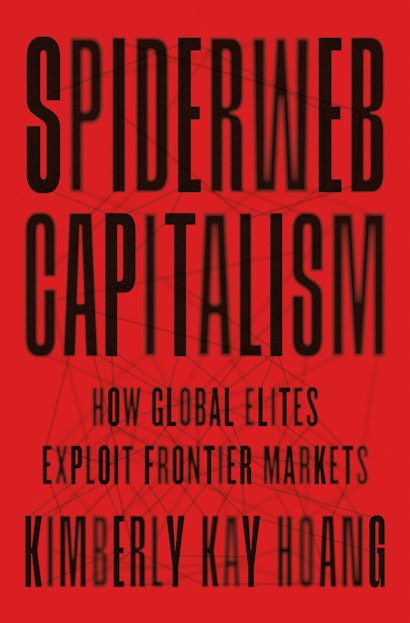This month, I am delighted to bring you Office Hours with Kimberly Kay Hoang, author of Spiderweb Capitalism: How Global Elites Exploit Frontier Markets. She has some excellent book recommendations, she offers valuable career advice for graduate students and junior faculty alike, and she shares a story that illuminates how a single conversation can completely change the trajectory of one’s research.
—Meagan Levinson, Executive Editor
ML: What are you reading now?
KKH: I am reading two books right now more for leisure.
Permanent Distortion: How Financial Markets Abandoned the Real Economy Forever by Nomi Prins. Over the past couple of years, I’ve been concerned about elite capture of academia and have found much more inspiration in the work by journalists who take a much more critical approach in exposing systems of welfare for the rich. Her concept of quantitative easing exposes how fractured policies crafted by financial institutions has led to the manipulation of central banking policies around the world. The book sheds light on the widening gap between billionaires and millionaires in what she calls permanent distortion. It also seems most relevant right now with news of a debt ceiling crisis.
Privilege and Punishment: How Race and Class Matter in Criminal Court by Matthew Clair. This is an incredibly rich study of criminal defendants and the differential ways in which they are processed in court based on their race and socioeconomic differences. This is a story about how those from working class backgrounds tend to become their own legal advocates in court while those with privilege navigate the courts with a greater level of trust in their attorneys to advocate on their behalf.
Both books make me think more deeply about the idea of impunity and the ways that it intersects with social class and race not just in the United States but globally.
ML: What book has had the most impact on your career?
KKH: To be honest I can’t name just one. I would say the three most influential books for me have been The Managed Heart by Arlie Hochschild, The Purchase of Intimacy by Viviana Zelizer, and Servants of Globalization by Rhacel Parreñas. What connects all three of these books is an analysis of intimacy and the economy. Emotional labor (Hochschild) and intimate labor (Zelizer) are ways of thinking about the links between the private and public spheres. Parreñas really pushed into new fields by thinking about these concepts globally and at the intersection of race, class, and gender more specifically in domestic work, care work, and sex work. These three texts really shape the foundation for my own sociological imagination.
ML: What is your favorite book to teach?
KKH: This changes for me every single year. In fact, I’m in the process of updating my syllabus right now, and I try to teach new books so that my courses provide students with some of the latest works published. I would say right now the book that seems to resonate with students and generate very interesting conversations is Ballad of the Bullet by Forrest Stuart. Being in Chicago and at the University of Chicago, there is a tradition of research on communities on the Southside. This book really advances that work by looking at poor urban youth and the use of social media technologies to capitalize on the public’s imagination of poverty and violence. To my surprise, many of my students know of the music Stuart studies in the book and appreciate the nuance that he brings to a study of a local community.
ML: Do you have a favorite moment as a researcher, maybe an encounter that unexpectedly changed your way of thinking or the direction of a project?
KKH: Absolutely. As an ethnographer those moments can feel like you’ve stumbled upon a diamond in the rough. For my latest book, Spiderweb Capitalism, I started with a small question about how foreign investors navigate new frontier markets around the world in different ways based on the laws that govern their investment activities abroad. I remember having lunch with a lawyer one afternoon when he asked me if I knew what a special purpose vehicle or holding company was. As he explained them to me, I found myself suddenly thrust into a whole world of offshoring, anonymous paper companies and a web of financial professionals who are connected but purposefully obfuscated from one other. This moment completely changed the trajectory of my research in ways that were both exciting and intimidating. It forced me to imagine a global ethnography that was not bound to a single space or place and instead theorize webs of people and capital that span the globe.
ML: What is the best career advice you ever received?
KKH: Everyone arrives on their own time. Do not compare yourself to others; instead, focus on your own journey. I think that the journey through a PhD program—and, later, tenure—can create this unhealthy navel-gazing that can make us feel inadequate in relation to those around us. But if you keep your head down and focus on the journey of scientific discovery while also finding joy in making sense of complex data, things do eventually fall into place in their own way and on your own individual timeline.
ML: What subject do you wish more sociologists would study and write about?
KKH: I wish that more sociologists would study elites and the systems that enable them to accumulate wealth. At the same time, I wish there were more research on the elite capture of the academy and social sciences more generally. I think that Charlie Eaton’s book, Bankers in the Ivory Tower, really begins to poke at these questions, but I would like to see much more research in this vein. I often think about how social scientists claiming to be objective researchers are, in many ways, either consciously or subconsciously working in a shadowy role of policy implementation that only serves to legitimize institutions of power. To me, this is concerning and dangerous, especially when it comes to proprietary data provided by private companies or governments.
ML: If you could have dinner with two sociologists, living or passed, who would you choose, and why?
KKH: I’ll pick one of each.
Ibn Khaldun, who has passed, is someone I would love to sit down with. I only discovered his book The Muqaddimah within the last couple of years and often wondered why this work is not part of the canon of sociology. I would love to hear him talk more about his theories of the rise and fall of dynasties, power through states and bureaucracies, and the birth of social groups.
I would love to have dinner with Ruha Benjamin. I have her book Viral Justice: How We Grow the World We Want on my nightstand and will read a chapter here and there before bed. It reminds me of this mantra that inspired me as a graduate student: “personal is political”. Viral Justice does this work of forcing us to confront systems of injustice as they relate to mental health and the carceral system while also offering a vision for how we might be inspired to build a more just world. Perhaps this is my way of manifesting this, but I would just love to have a one-on-one dinner with her because I feel that I would not only learn so much but also find inspiration in her idea of collective healing. I think that as sociologists we are very good at identifying problems and systems of injustice and less creative when it comes to finding viable solutions to the problems we care about so deeply. Viral Justice provides a great model that broadens my imagination.
Kimberly Kay Hoang is associate professor of sociology at the University of Chicago. She is the author of Dealing in Desire: Asian Ascendancy, Western Decline, and the Hidden Currencies of Global Sex Work. She lives in Chicago. Twitter @kimberlykhoang

